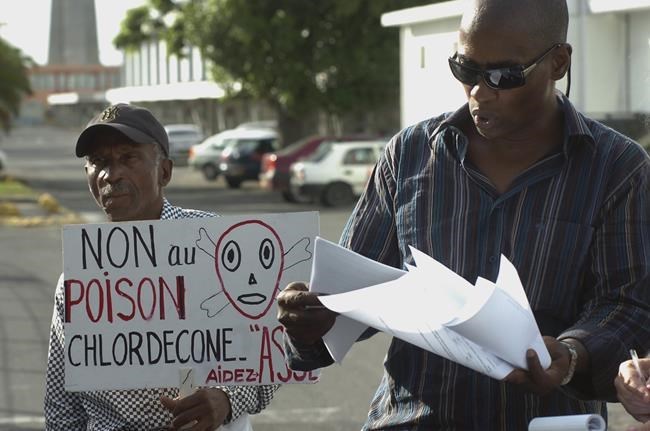
FILE - Lawyer Harry Durimel, right, stands next to an activist with a sign that reads in French "No to Chlordecone poison," as they protest during the arrival of the French government's Health Minister Roselyne Bachelot in Raizet Abymes, Guadeloupe, Nov. 18, 2007. Durimel is among the attorneys representing agricultural workers in Guadeloupe and Martinique in a separate lawsuit demanding trial for those who allowed the use of a banned pesticide known as chlordecone. (AP Photo/Dominique Chomereau-Lamotte, File)
Republished June 27, 2022 - 6:15 PM
Original Publication Date June 27, 2022 - 4:26 PM
SAN JUAN, Puerto Rico (AP) — A court in Paris found the French government guilty of wrongful negligence involving the former use of a banned pesticide in the French Caribbean islands of Guadeloupe and Martinique but denied compensation to those affected, officials announced Monday.
The ruling was bittersweet for activists and attorneys who argued that the French government's authorization to use chlordecone in those islands was illegal as they sought damages for the defendants.
“This decision is a significant step forward in the sense that the fault of the state is recognized,” Christophe Leguevaques, one of the attorneys involved in the case, told The Associated Press. “On the negative side, the court does not recognize financial reparations for the victims... . However, West Indians have been exposed and are still exposed to this dangerous product.”
The lawsuit is one of at least two filed against the French government involving the use of chlordecone in Guadeloupe and Martinique. The first lawsuit, filed in 2006, is still pending before the courts and accuses the French government of failing to protect the health of its people and not doing enough to identify and limit the effects of chlordecone pollution in both islands.
On June 25, a judge in France temporarily set aside the lawsuit to allow for three months of research.
“We want the court to condemn the persons who put money before health,” attorney Harry Durimel told the AP, adding that officials sought to keep using chlordecone because they were in competition with banana producers from Latin America. “They are known. They are ministers, directors and politicians from Guadeloupe and Martinique. ... We want them to go to trial.”
Chlordecone is a pesticide known as Kepone that the U.S. banned in 1976 and is blamed for slurred speech and other neurological problems. French officials have said they worry it could be linked to high rates of prostate cancer in Guadeloupe and Martinique, and some studies have suggested it may be linked to premature births. The Stockholm Convention has banned its production and commercialization since 2004.
Chlordecone was legally marketed in France from 1981 to 1990 and was used for three additional years in Guadeloupe and Martinique to fight the banana weevil under an exemption granted by the French government. Attorneys and activists have argued that the exemption was illegal. In a response filed in April, France’s agriculture minister asked that the court reject the lawsuit, saying it was inadmissible and noted that the government had since taken numerous steps to protect people’s health, including banning fishing in certain areas.
Elie Califer, a legislator who represents Guadeloupe, described the recent ruling as a considerable step forward but said he would push for the creation of a victim compensation fund and demand that the government invest in further cleaning of still-polluted areas, among other things.
“It’s high time that the state, responsible for this serious pollution and accountable for this contamination, take all responsibility,” he said.
France’s government has estimated that more than 90% of adults in Guadeloupe and Martinique were exposed to chlordecone. The islands have a combined population of some 750,000 people.
The newest lawsuit sought, among other things, 15,000 euros ($15,900) for each person who lived for at least12 consecutive months in Guadeloupe or Martinique since 1972. But the Administrative Tribunal of Paris wrote in its 13-page ruling that the defendants do not mention any personal or detailed elements “justifying the damage of anxiety they claim.”
However, the court ruled there was wrongful negligence committed by France’s Ministry of Agriculture and noted that the use of chlordecone has permeated Martinique and Guadeloupe and led to the “pollution of certain soils, drinking water and certain marine areas, and that agricultural workers have been exposed to this substance.”
In response to the ruling, the government of Guadeloupe issued a statement noting that blood analyses to detect chlordecone remain free of charge and that more than 3,800 people were tested last year. Officials added that such analyses will be available soon in Martinique.
In addition, officials said the government offers free soil testing for farmers and those with gardens, as well as water testing for those who qualify. They also noted that fishermen already are receiving payments for lost revenues as a result of chlordecone contamination.
Regardless of those measures, Leguevaques, the attorney, said he recommended that the ruling be appealed and said questionnaires will be sent to all defendants to obtain details to once again demand compensation. He published the ruling on his website and wrote: “The fight goes on.”
___
Associated Press reporter Nicolas Vaux-Montagny in Lyon, France contributed.
News from © The Associated Press, 2022